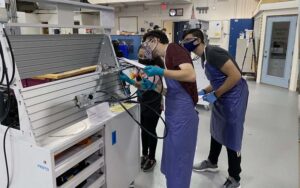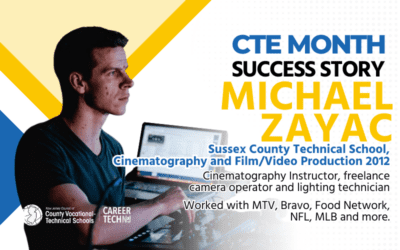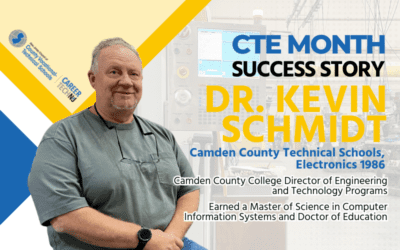
Stefany Gurgel (left), an instructor in the advanced manufacturing and robotics program at Monmouth County Vocational School District, assists her students.
Successful professionals in technology, trade, medical and a host of other industries are finding fulfilling second careers in a place they probably never expected to revisit — the high school classroom.
New Jersey’s “alternate route” to teacher certification provides a pathway for industry professionals to be hired as provisional teachers, adding valuable experience and a true workplace perspective to their career and technical classrooms and labs.
“We seek professionals working in every industry, from the biomedical sciences to automotive technology, and carpentry to computer science,” said Michael Dicken, superintendent of Gloucester County Vocational-Technical School District and president of the New Jersey Council of County Vocational-Technical Schools. “We want people who have had success working in the real world to share their technical skills and on-the-job experiences, so we can inspire and prepare our future workforce.”
Facing a shortage of career and technical education teachers, the council is advocating for streamlined requirements, and seeking to raise awareness of this career opportunity — and the many benefits that come with it.
“Most people may think having summers off is the biggest reward, but that’s not true at all,” said Timothy Regan, an electrical instructor at Bergen County Technical Schools. “It’s the success. It’s seeing how far the students come and knowing that I helped them find success, not just in the classroom, but in life. When I get calls and texts from students buying a new work truck or fixing up their house, that’s the most rewarding part of this job.”
Regan still recalls taking his daughters to a Bon Jovi concert at Madison Square Garden and looking down to see a former student on stage setting up for the show. For him, that feeling was more exhilarating than any of the music he heard that night.
As a small business owner of his own electrical company, Regan has scaled back his work outside the classroom to mostly help longtime customers and family and friends. It was a former customer who first introduced him to the idea of teaching. Today, he is grateful for her persistence in connecting him with BCTS.
“I love career and technical education, and I know it is so important, especially because so many industries are experiencing worker shortages,” he said.
Regan’s colleague at BCTS, Dr. Frank Castella, transitioned to teaching after a car accident caused career-ending injuries; the former chiropractor’s right wrist would never fully recover. At his wife’s suggestion, Castella began the alternate route process, earned his teaching certificate, and started teaching biology on BCTS’ Teterboro Campus.
That was in 2003. Today, Castella remains with BCTS, but teaches in a relatively new health professions program he helped shape at the Applied Technology High School located on the campus of Bergen Community College in Paramus.
“I draw upon my own experiences to add a clinical focus to the program,” Castella said, noting that the students’ hands-on learning often takes place in a clinical setting with a set of simulators, or medical mannequins, to mimic patient experiences. “It’s amazing to see the students piece together what they learn and form an accurate diagnosis.”
Castella said he never thought this is what he’d be doing when he first started teaching at BCTS. He received invaluable assistance from colleagues when learning how to develop curriculum and quickly became comfortable in front of the classroom. Part of his own teaching persona is remaining positive to help inspire students to pursue their dreams.
“We need great health professionals, so I encourage my students to find what they enjoy and go out and do wonderful things,” he said.
Another in-demand field, computer science, not only needs highly trained employees to fill positions, but teachers to introduce bright, young minds to career possibilities and the skills needed to pursue them. Naima Aite first answered that call for teachers in her native country, Algeria. While working for a startup there, her old high school contacted her and asked if she would fill in to teach computer science. When her husband moved to the U.S. for work, she joined shortly after and reevaluated her various career options.
“I spoke three languages well and a little bit of English; I wasn’t fluent in English at the time,” Aite said. She gained fluency while back in school earning her second master’s degree, this one from Rutgers University in information technology and analytics. Then, she had two children and decided to explore teaching again — something that would work with her young family’s schedule.
Aite was hired in December 2020 by Ocean County Vocational Technical School as an instructor for a computer science program. She is still pursuing her permanent teaching certification through coursework at Brookdale Community College. She admits being both a teacher and a student at the same time is “very challenging,” but she knows more flexibility is on the horizon. And, she is motivated by what she gets out of teaching.
“It’s a rewarding profession; you get to celebrate students’ milestones and have a positive impact on their lives,” she said.
Nicholas Keefe, a welding instructor at Salem County Vocational Technical School District, also attended Brookdale, which has an alternate route program specifically for aspiring CTE teachers. Having a group of peers in his position gave him an invaluable support system to get through the required instruction.
“It was challenging, but I’m happy I made the switch,” Keefe said. “The biggest takeaway for me is, no matter what I have built with my hands, it will never have as much of an impact on the world as what I am doing here. I am helping each student find their way, and that will potentially affect everyone they brush into who benefits from their work.”
Stefany Gurgel, an instructor in the advanced manufacturing and robotics program at Monmouth County Vocational School District, also has no regrets about becoming a CTE teacher.
Gurgel previously worked in construction management for three years after graduating from Rutgers University with a civil engineering degree. She always wanted to go back to school, and discovered alternate route programs when exploring her options. She decided to start the process, and, when she learned MCVSD was launching a manufacturing program, she saw it as a clear signal to pursue teaching.
“Over the last four years, since I took this teaching job, there has never been one day when I have woken up and not wanted to go to work,” she said. “That tells me I’m in the right place.”
Conversation Starter
Are you interested in helping to train the next generation who will enter your field? Teachers are always needed to lead career and technical education programs at New Jersey’s county vocational-technical schools. Find a school near you and inquire about current teaching opportunities: careertechnj.org.
Read this article as it originally appeared in ROI-NJ Dec.2



